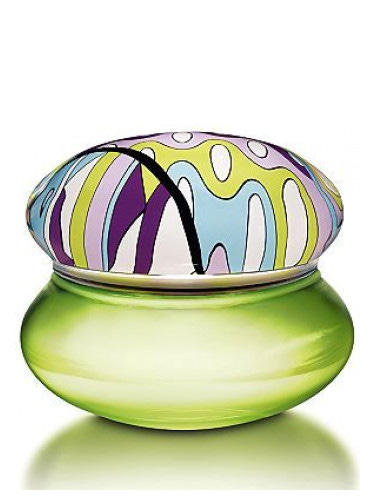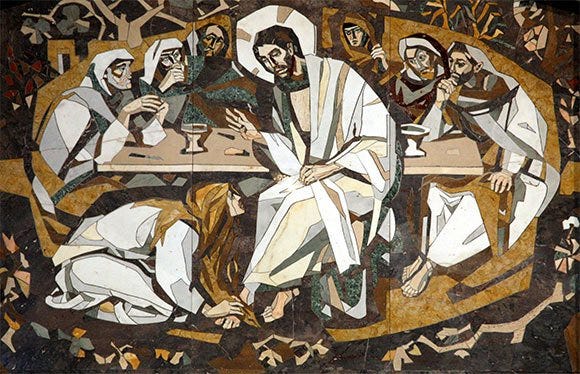Emilio Pucci and Memories of Jesus
A Good Friday reflection on smell, memory, and self-denial
They say memory is most strongly triggered by smell. My memory is triggered whenever I get a whiff of “Vivara” by Emilio Pucci.
Tomorrow, Saturday, April 19, marks 15 years since I first smelled that perfume. I had, uncharacteristically, asked a young woman I’d only met once or twice if she would be interested in getting coffee. (I was always a painfully shy and awkward former homeschooled kid, so I can’t stress enough how NOT me this move was.)
We got that coffee and have been married for nearly 13 years.
My wife Jillian wore Vivara (she still has some, but since it is discontinued, she uses it sparingly), and that day was the first time I smelled it. I remember in particular the first time I picked her up from her house on our second date and how the fragrance filled my car. It was intoxicating and exciting! I’ve never forgotten it.
If I get a whiff of that perfume now, I’m instantly transported back to those early years of our relationship, filled with joy and many reminders as to why I love my wife.
Memories of Jesus
I imagine something similar may have happened at times to John, the Gospel writer, Mary of Bethany, and the other disciples of Jesus who were there the day when Mary poured an entire bottle of perfume onto Jesus’ feet (John 12:1-8).
About a pound of nard from Nepal would have cost a fortune, but Mary, Jesus tells us, was saving it to prepare him for his burial. The musty, earthy, somewhat pungent scent filled the house, John tells us, as she poured it out over Jesus’ feet and wiped it off with her own hair.
Within a week of this incident, according to John’s telling, Jesus would be crucified and resurrected. Within fifty days, he would ascend to the Father and send the Holy Spirit. Their lives were about to change dramatically as many of them would be led by the Spirit into lands that they never dreamed of traveling to. Foreign, strange lands, in which they would see and experience new and uncomfortable things, and be asked by the Spirit time and time again to deny themselves to carry the message of the gospel.
Yet how much that smell must have stuck in their memories.
As they came into a new city to proclaim the good news of Jesus, facing intense opposition and hardship, perhaps they walked through the local market and caught a whiff of that sharp and bitter scent. What would they remember?
They would probably have been transported back to that dinner in Bethany. Back to those last precious moments physically present with Jesus. They would probably be transported back to what that anointing was all about: preparing for his death.
They would certainly have been reminded of the horrific execution their beloved Jesus endured. The injustice of it all. Their fear and uncertainty in the few days following his arrest.
But they would also be reminded of their precious Master’s self-denial. His constant talk of love for the Father and how the Father loved them and the world, too. They would be reminded of how Jesus endured the cross, denying himself for that love.
I wonder if there were moments throughout the rest of their lives when they questioned what they were doing, far away from home in a strange land, among strange people, and would get a whiff of nard. (The word just doesn’t roll off the tongue no matter how you say it.)
Perhaps they would remember that they were invited to embrace the same life of self-denial that God embodied in Jesus.
Self-Denial
Of particular interest in John’s account of the story are Mary and Judas, who in some ways represent two different responses to the God who embodied self-denial.
Mary responds to Jesus with a costly gift of expensive perfume and with a demonstration of adoration that came with great social cost to her reputation. She extends the self-denial of Jesus through her own act of self-denial.
Judas responds with indignation that this money would be used irresponsibly and not given to the poor. His care, of course, was not for the poor, but because there would be less in their ministry budget for him to skim for his own personal gain. Judas’s response to Jesus’ self-denial was self-preservation to the point of trying to use Jesus’ own teaching to insulate himself from the call to obey and act in kind.
Because of our familiarity with this story it is easy for us to roll our eyes at Judas yet N.T. Wright reminds us to, “Put aside your natural inclination to distance yourself from Judas. After all, even at that last moment none of the other disciples had suspected him of treachery. Can you see just a glimpse of him as you look in the mirror?”
I wonder this Good Friday how the American church may be rationalizing its own self-protection? Do we see a glimpse of Judas within? We say, “We need to have more money so we can reach more people with the gospel message!” or, “If we speak the truth about this social issue, we will lose our good reputation with certain people in the community, or congregants might leave.”
Certainly, the very nature of self-denial can be so painful and costly that we must acknowledge we have a natural reflex to avoid it at all costs, to preserve ourselves even in theological and biblical terms, as Judas seemed to do.
Far off in a foreign place, distant from Jesus’ time and land, might we need a whiff of something to help recapture our imagination for self-denial?
The French monk, Francois Fenelon, wrote: “The most essential point is lowliness. It is profitable for all things, for it produces a teachable spirit which makes everything easy. You would be more guilty than many others if you made any resistance to God on this point.”
I can only speak of my own experience, but I have found Fenelon’s words to be true time and time again in my formation journey. When I do not accept the lowliness of self-denial because of how I might be perceived, I lose the ability to learn, grow, and I become deceived into thinking I know more than I do. I become arrogant in my own self-sufficiency, and as a result, I become foolish and increasingly unteachable.
In other words, I move farther away from the likeness and image of God in Jesus that Christians are called to become.
Yet when I deny myself, when I am giving myself to others, I do lose some things: Opportunity, relationships, status, money, etc. But I find myself increasingly curious about the world and the people to whom I am attending.
In doing so, I learn about God and how God embodies self-denial for the sake of the world in Jesus. This learning enables the transformation to become like Him.
Smells Like Self-Denial
From my understanding, Catholic and Anglican churches, usually full of incense, never employ it on Good Friday. I’m sure there are theological and liturgical reasons for this, but considering how closely the smell of a certain perfume was associated with preparation for Jesus’ death and burial, I wonder if it would be helpful on Good Friday to have particular smells associated with it to help us remember how lowly God became for our benefit.
When I smell that old perfume of my wife, I become almost superhumanly motivated to love her in a self-sacrificial way. Perhaps some kind of similar triggering of the senses on Good Friday would be appropriate to increase our affections for Jesus and offer a reminder of our call to faithful self-denial?
Whether or not that becomes a practical reality, the point is still the same. Today is a day to reflect on the immensity of God’s self-denial through death and burial. To consider the ways in which we practice self-preservation and rationalize it theologically. And to embrace the suffering of the cross as we turn to others and attend to them and their world, just as Jesus did.
Thank you for reading and supporting ‘Under the Eyes of God’. If this was helpful to you, please share with someone you think might appreciate this article.





I’ve never made the connection between the perfume Mary used to anoint Jesus and the way our sense of smell brings back memories and puts us into a certain state. Very enlightening.